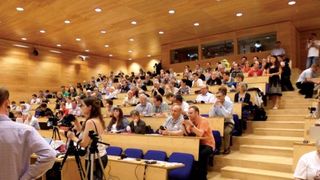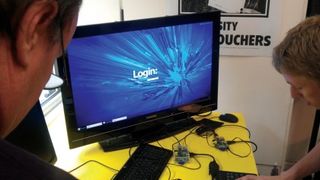Raspberry Jams: why Raspberry Pi is going back to school
A recipe for success
I think that if I had this to do again, I would assemble a team to help spread the work across many shoulders.
Every Jam is different

I've attended a few Jams around the UK, Cambridge, Manchester and York. And each has their own way of doing things. For instance, the Cambridge Jam in July 2012 was a very formal event, with a lecture hall being the venue for a series of talks from the Raspberry Pi Foundation.
I caught up with the organisers of three popular Jams: Michael Horne from Cambridge, Ben Nuttall from Manchester and Jack Wearden from Birmingham Raspberry Jams.
Linux Format: Who comes to your Raspberry Jam?
Ben Nuttall: We get a range of people attending the Jams: parents, kids, teachers, middle-aged electronics hobbyists and 20s to 30s techies. Sometimes a parent brings their son or daughter along to learn about computers as they're not getting anything out of what they do on computers at school, and they'll often come back with a few friends, or the rest of the family.
Jack Wearden: We've had all manner of people attend, ranging from parents and children to Linux professionals and even a heart surgeon!
Michael Horne: At the last Jam, it was mostly adults who attend but with a wide age range from university students to much older hobbyists.
Get daily insight, inspiration and deals in your inbox
Get the hottest deals available in your inbox plus news, reviews, opinion, analysis and more from the TechRadar team.
LXF: Why did you start your Jam?
BN: I ordered a Raspberry Pi as soon as I could get on the website on the morning they were released, and I kept asking at MadLab if there would be a Raspberry Pi user group. It was suggested that maybe I should start one - and so I did. I ran a one-off Jam and people wanted to do it again, so I ran another. It seemed to be going well so I said I'd keep running them as long as people kept coming. There's no sign of it slowing down…
JW: Mainly to bring the community spirit of the Raspberry Pi into an academic environment, but also to allow younger attendees to get a glimpse into what computing involves at an academic level.
MH: I'd been to the Milton Keynes Jam and felt inspired to run one closer to where I lived. Cambridge seemed the most logical place as it is where the Pi was 'born'.

LXF: How often do you meet?
BN: We meet monthly, usually on a Saturday. The exact date depends on availability of the space at Madlab, especially now we require both floors due to popular demand!
JW: We've met once before and a second is in the planning - it gets difficult to arrange around the university timetable, but we're hoping to run another at the start of the next term.
MH: The Jam I ran in May was the first one I've organised and the first in Cambridge for almost a year. We haven't settled on a regular venue yet. The Jam was held at the Centre for Mathematical Sciences and I'm hoping the next one will be on the Milton Science Park in July. I'm hoping that they will always be in Saturday afternoons as that seems best for most people and, in particular, families.
LXF: What structure does your Jam follow?
BN: I usually leave it open to what people want to do - I tried encouraging people to give talks and demos and we had a few early on, but generally people just turn up and want to hack, so we usually just end up doing that.
Since we get a number of novices, it's good to ensure everyone has something to do - so sometimes we have a skill-sharing initiative, where people write on sticky notes any skills they want, or skills they have, and we try to pair people up accordingly. There are always projects going on around the room and newcomers can always join in with what another group is working on.
